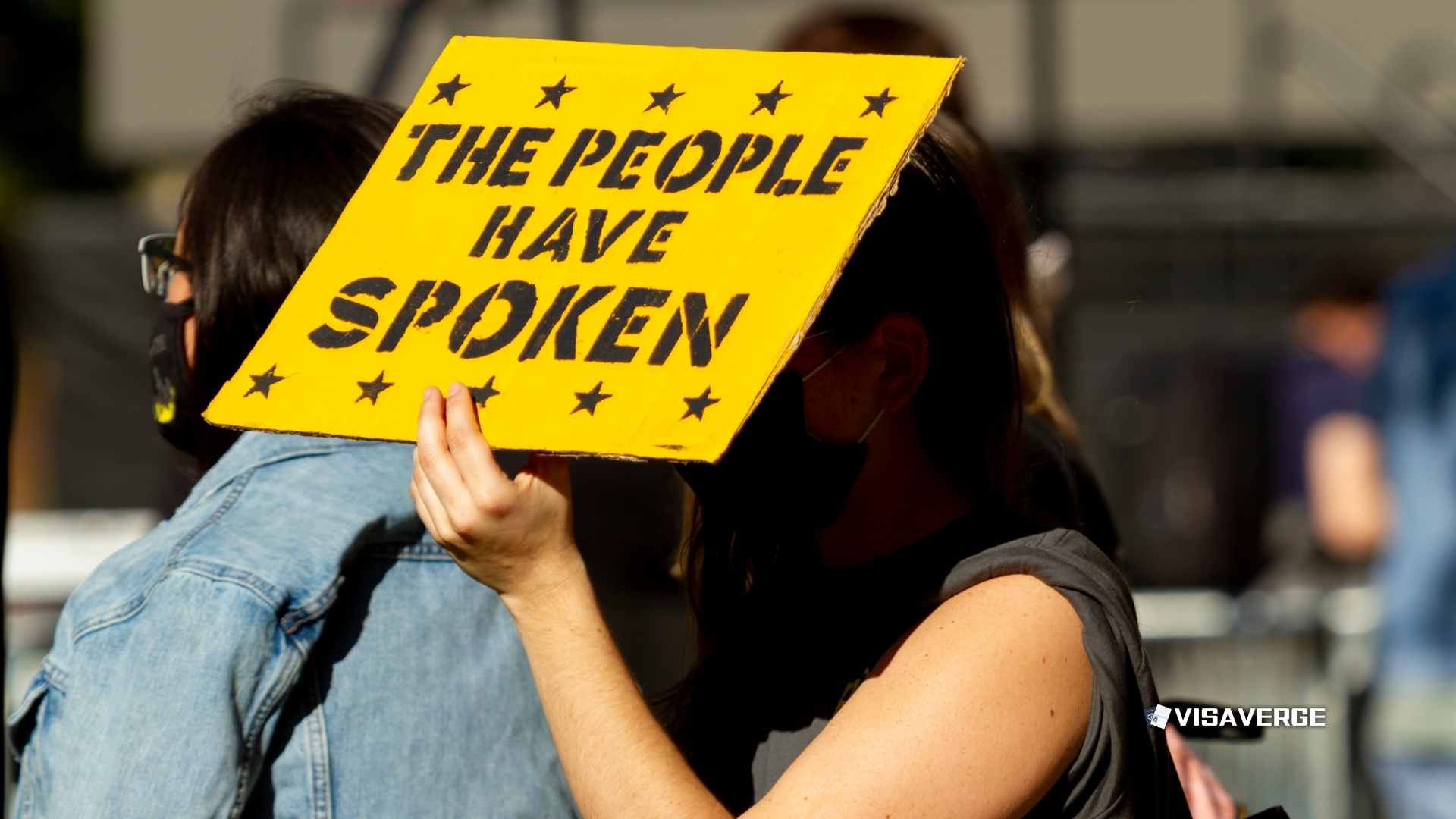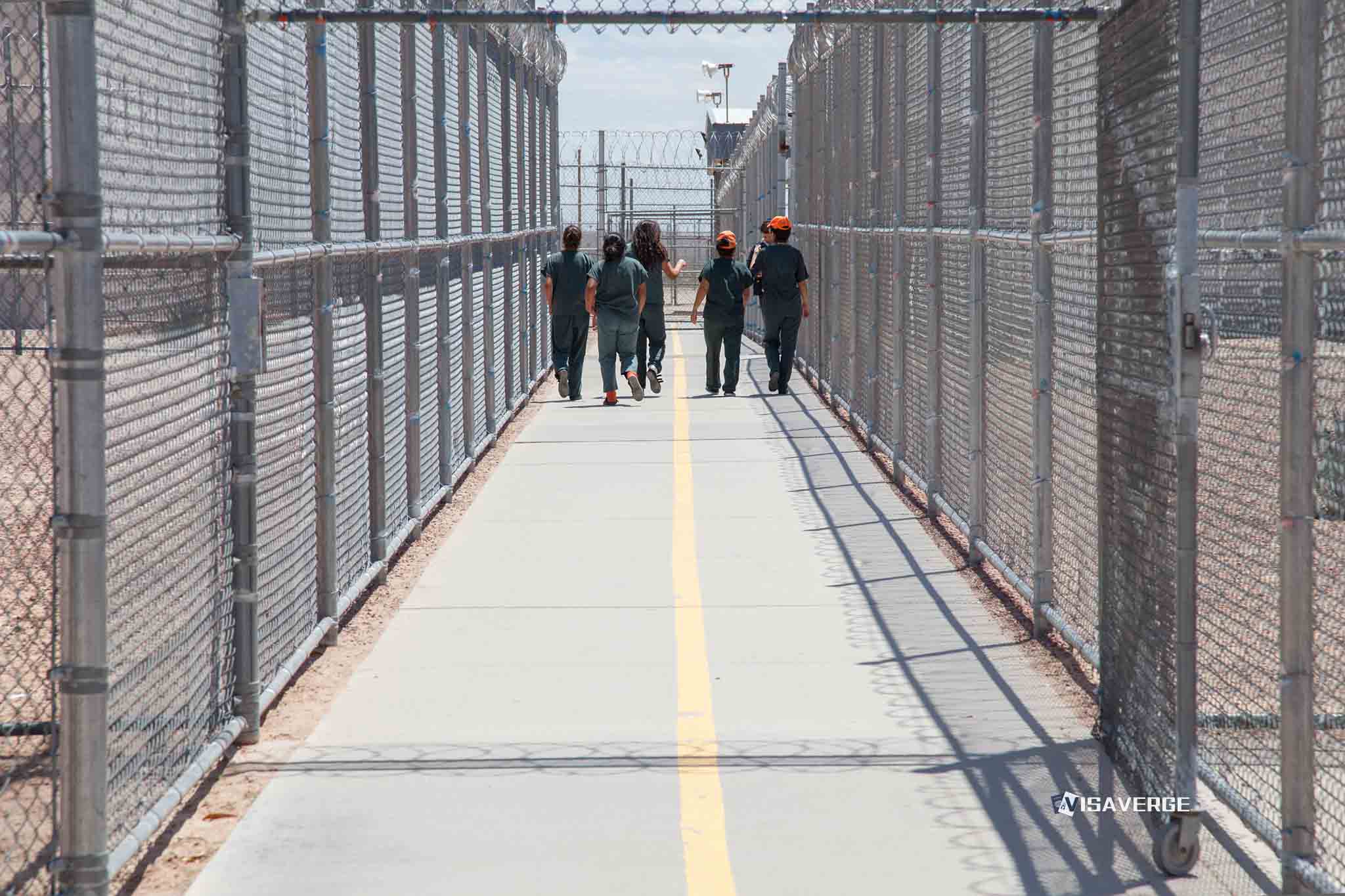Key Takeaways
• Hundreds gathered June 15, 2025, in Nampa for the peaceful “No Kings” rally opposing Trump immigration policies.
• ICE increased raids and deportations in 2025, triggering fear among immigrant communities nationwide.
• Protesters demand unity against healthcare cuts, DEI program reductions, and rising prices affecting immigrants.
On June 15, 2025, the city of Nampa became a focal point for national concerns about immigration and deportation as hundreds gathered outside Nampa City Hall for the “No Kings” rally. This event, part of a wave of protests across the United States 🇺🇸, brought together people worried about the Trump administration’s immigration policies, healthcare changes, and other social issues. The rally’s peaceful atmosphere, combined with the presence of counter-protesters, highlighted the deep divisions and strong feelings surrounding immigration in the country today.
What Happened at the Nampa “No Kings” Rally?

The “No Kings” rally in Nampa was one of many held nationwide on June 15, 2025. Protesters carried signs reading “No Kings Since 1776,” “Liberty and Justice for All,” and “Love Your Neighbor, Not Your Government.” The event aimed to show unity and stand against what organizers see as unfair policies affecting immigrants and other vulnerable groups.
Liz Anderson, a volunteer at the event, explained, “The movement is about unity because there is a divide and conquer strategy that’s happening right now where people are more divided than ever, and that’s the movement that we’re helping feed is uniting the people.” Her words reflect the rally’s main goal: bringing people together to support those at risk due to recent policy changes.
Across the street, counter-protesters waved pro-Trump banners, showing support for the administration’s actions. This peaceful but tense standoff mirrored similar scenes in cities like Tampa, Sarasota, Bradenton, and Philadelphia, where thousands joined the “No Kings” movement.
Why Are People Protesting? The National Context
The Nampa rally was not an isolated event. It was part of a larger response to recent actions by the Trump administration, especially around immigration. Since the start of President Trump’s second term, federal immigration enforcement has become stricter. Immigration and Customs Enforcement (ICE) has increased the number of raids and deportations, leading to fear and uncertainty in immigrant communities.
Protesters are also worried about other issues, such as:
- Healthcare cuts: Changes to healthcare policies have made it harder for immigrants and people with disabilities to get the care they need.
- Diversity, Equity, and Inclusion (DEI) programs: Cuts to these programs have left many marginalized groups, including LGBTQ+ people and people of color, feeling less supported.
- Rising prices: Tariffs and new immigration rules have contributed to higher costs for everyday goods, affecting both immigrants and native-born Americans.
According to analysis by VisaVerge.com, these combined pressures have led to a surge in activism, with communities organizing to resist policies they see as harmful.
How Immigration Enforcement Works: Step by Step
Understanding how immigration enforcement works helps explain why so many people are concerned. Here’s a simple breakdown of the process:
1. Identification: ICE identifies people they believe are in the country without legal permission.
2. Detention: These individuals may be detained during raids at homes, workplaces, or public spaces.
3. Court Proceedings: Detainees are brought before immigration courts. They can ask for asylum or other forms of protection, but the process is often quick and confusing.
4. Deportation: If the court denies relief, the person is deported to their home country.
For more details on how ICE operates, you can visit the official ICE website.
Organizing a Protest: What’s Involved?
Protests like the one in Nampa don’t just happen overnight. Organizers follow several steps to make sure events are safe and effective:
- Permitting: They get the necessary permits from local authorities.
- Publicity: Events are shared through social media and community networks to gather support.
- Safety Planning: Organizers work with law enforcement and medical teams to keep everyone safe.
- Execution: On the day of the protest, participants are encouraged to remain peaceful and follow the law.
Officials, including Arizona Governor Katie Hobbs and Pennsylvania Governor Josh Shapiro, have urged protesters to exercise their First Amendment rights responsibly. Philadelphia District Attorney Larry Krasner reminded demonstrators, “If you are doing what Martin Luther King would have done, you’re going to be fine.”
The Impact on Immigrants and Their Families
The increase in immigration raids and deportations has real consequences for families in Nampa and across the United States 🇺🇸. Many immigrants now live in fear of being separated from their loved ones. Children may come home from school to find a parent missing. Spouses worry about sudden detentions during routine activities.
Key effects include:
- Family separation: Deportations often split families, leaving children and spouses behind.
- Economic hardship: When a family member is deported, the household may lose income, making it harder to pay for food, rent, and other needs.
- Community anxiety: Fear of raids and deportations spreads beyond those directly affected, creating stress and uncertainty for entire neighborhoods.
Economic and Social Effects
Immigration policies don’t just affect immigrants. They have a ripple effect on the whole community:
- Rising prices: Tariffs and stricter immigration rules can make goods more expensive, which hurts everyone, not just immigrants.
- Reduced access to healthcare: Changes to healthcare laws mean some people, especially immigrants and those with disabilities, struggle to get the care they need.
- Cuts to DEI programs: When diversity and inclusion programs are reduced, people from minority backgrounds may feel less welcome and supported.
These changes have led to more people joining protests like the one in Nampa, hoping to push for fairer policies.
Multiple Perspectives: Protesters, Counter-Protesters, and Officials
The “No Kings” rally in Nampa brought out a range of voices:
- Protesters: Many are worried about immigration raids, healthcare cuts, and rising prices. They want to show unity and support for those affected by recent policies.
- Counter-Protesters: Supporters of President Trump’s policies believe stricter immigration enforcement is necessary for national security and economic stability.
- Officials: Local and state leaders have called for peaceful protests and respect for the law. They stress the importance of exercising free speech without violence.
This mix of opinions shows how complex and emotional the immigration debate has become in places like Nampa.
Historical Background: The “No Kings” Movement
The “No Kings” movement takes its name from American revolutionary ideals. Protesters use slogans like “No Kings Since 1776” to remind people that the United States 🇺🇸 was founded on the idea of resisting unchecked power. Organizers see current immigration policies as a threat to these values, especially when they believe the government is acting without enough checks and balances.
The movement has grown in response to what many see as an increase in authoritarian actions, especially around immigration and social issues. As more people feel the impact of these policies, the movement has gained strength in cities and towns across the country, including Nampa.
Recent Policy Changes and Official Responses
While no specific new executive orders or memos have been detailed in public sources, it’s clear that immigration enforcement has become more aggressive since early 2025. This shift has led to:
- More frequent raids: ICE is conducting more operations in both large cities and smaller towns.
- Increased deportations: Although exact numbers for Nampa are not available, national reports show a rise in people being removed from the country.
- Greater fear in immigrant communities: Many people are avoiding public spaces, skipping work, or keeping children home from school to avoid possible encounters with immigration authorities.
State and local officials have responded in different ways. Some, like Arizona Governor Katie Hobbs, have encouraged peaceful protest and respect for free speech. Others, like Philadelphia District Attorney Larry Krasner, have warned against breaking the law during demonstrations.
Community Resilience and Ongoing Activism
Despite these challenges, immigrant communities and their allies in Nampa and elsewhere are showing resilience. They are:
- Organizing support networks: Community groups are helping families affected by raids and deportations.
- Providing legal assistance: Organizations like the American Civil Liberties Union (ACLU) and the National Immigration Law Center offer resources and legal help to those in need.
- Educating people about their rights: Workshops and information sessions teach immigrants how to protect themselves during encounters with law enforcement.
These efforts help build solidarity and give people hope, even in difficult times.
What’s Next? The Future of the “No Kings” Movement
The “No Kings” movement is expected to continue as long as current immigration policies remain in place. Organizers in Nampa and other cities are planning more rallies and events to keep attention on these issues. While there have been no official announcements about changing immigration policy, the pressure from ongoing protests may influence future decisions.
Immigrant communities are likely to keep organizing and advocating for their rights. As more people join these efforts, the movement may grow even stronger.
Practical Guidance for Immigrants and Supporters
If you are an immigrant or support someone who is, here are some steps you can take:
- Know your rights: Learn what to do if approached by ICE or other law enforcement. The ACLU provides helpful resources at aclu.org.
- Seek legal help: If you or a loved one is at risk of deportation, contact organizations like the National Immigration Law Center for advice.
- Stay informed: Follow updates from trusted sources and community groups.
- Get involved: Join local support networks or attend peaceful protests to show solidarity.
For official information about immigration enforcement and your rights, visit the U.S. Citizenship and Immigration Services (USCIS) website.
Common Questions and Concerns
What are the risks of attending a protest?
While most protests, like the one in Nampa, are peaceful, there is always a risk of confrontation with counter-protesters or law enforcement. Officials recommend staying calm, following instructions, and knowing your rights.
How can immigrants protect themselves?
– Carry identification and important documents.
– Avoid unnecessary contact with law enforcement.
– Have a plan for who to call if detained.
– Know your legal rights and seek help if needed.
What are the long-term effects of current policies?
Long-term effects may include more divided communities, economic hardship for families, and reduced access to healthcare and social services. However, increased activism and community support can help counter some of these challenges.
Contact Information and Resources
- Nampa City Hall: 411 3rd St S, Nampa, ID 83651; Phone: (208) 468-5400; Website: nampa.org
- Immigration and Customs Enforcement (ICE): ice.gov
- American Civil Liberties Union (ACLU): aclu.org
- National Immigration Law Center: nilc.org
Final Thoughts
The Nampa “No Kings” rally is just one example of how communities across the United States 🇺🇸 are responding to changes in immigration policy. As reported by VisaVerge.com, these protests reflect deep concerns about family separation, economic hardship, and the future of American values. Whether you are an immigrant, a supporter, or simply someone interested in these issues, staying informed and involved is more important than ever.
By working together, communities like Nampa can continue to stand up for fairness, unity, and justice for all—no kings, just people looking for a better life.
Learn Today
No Kings → A protest movement opposing authoritarian immigration policies, named after US revolutionary ideals rejecting monarchy.
ICE → Immigration and Customs Enforcement, a federal agency enforcing immigration laws and detaining unauthorized immigrants.
DEI → Diversity, Equity, and Inclusion programs aimed at supporting marginalized groups in workplaces and communities.
Detention → The temporary holding of individuals suspected of immigration violations before court proceedings.
Deportation → The legal removal of a non-citizen from the U.S. after immigration court denial.
This Article in a Nutshell
On June 15, 2025, Nampa hosted the “No Kings” rally protesting stricter immigration enforcement. The event highlighted community divisions, fears of deportation, and demands for unity amid healthcare cuts and rising costs. Locals joined nationwide activism opposing Trump administration policies impacting immigrant families and social inclusion.
— By VisaVerge.com








